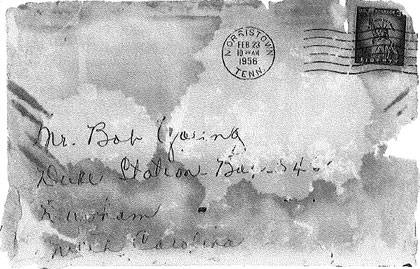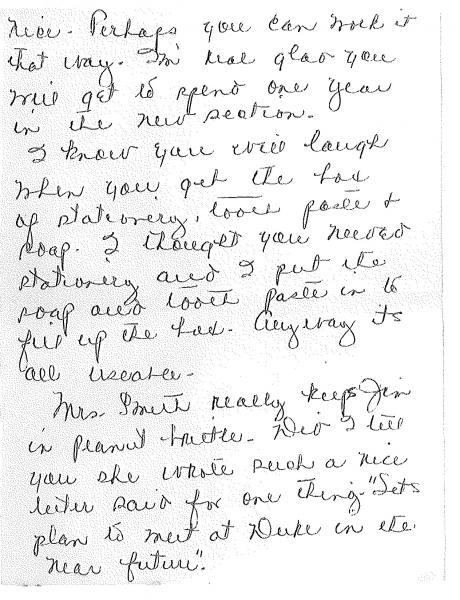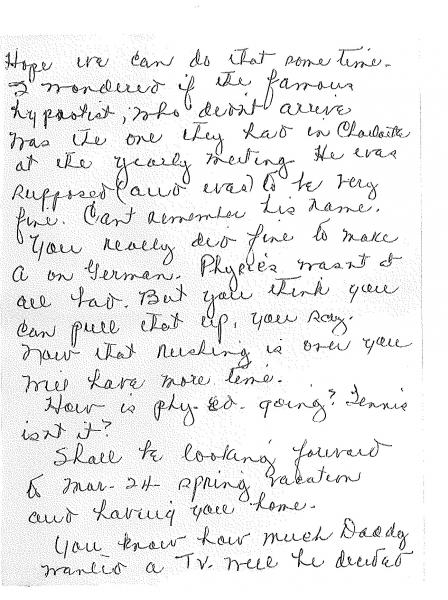Letter from the Past: A Mom's Eternal Worry
58-year-old letter to late Robert Young '57, MD'61 found during construction in West Campus Union

On a chilly day in February 1956, Kathryn Young sat down to write her son Bob, then a junior at Duke, and remind him as only a mother could that it was "cold-catching season" and to "be careful and don't go without a coat."
In a delicately handwritten note, Young went on to compliment her son on his A in German and alert him to a coming shipment of toothpaste and soap -- the kinds of tender banalities that would be recognizable to generations of Duke students and parents. What makes the letter unusual is its surprising reappearance almost 58 years to the day after it was mailed -- and the quick thinking of a construction worker and a student to preserve it.
The letter resurfaced in February of this year during renovations in the West Campus Union. Construction worker Demetrious Hinton was removing wainscoting near Great Hall when he saw a yellowed envelope stuck behind the paneling. The envelope was postmarked from Morristown, Tenn., on Feb. 23, 1956. It had been opened and four folded pages were tucked inside. Hinton realized he was looking at something potentially important, but he wasn't sure what to do with it. So he took the envelope and walked out to the Bryan Center Plaza, where he flagged down the first passerby he saw.
That passerby was Caitlin Koehler, a sophomore on her way back to her dorm after class. "He was holding (the letter) in his hand," Koehler says. "He stopped me and said, 'We found this while doing demolition.' He said he didn't want to throw it away, but he didn't know what to do with it. So he just handed it to me."
Koehler had done research for a class project at the Rubenstein Rare Book and Manuscript Library and recalled seeing similar kinds of personal letters in the library's collections. She contacted the Rubenstein staff, who set about tracking the letter's origins.
From the postmark date and address, university archivist Valerie Gillispie identified the letter's recipient as Robert Young '57, MD'61. After earning his Duke degrees, Young became a pediatrician and spent nearly 30 years running a small family practice in Lumberton, N.C., before he died of pancreatic cancer in 2000. His mother Kathryn spent her later years in Lumberton, passing away in 1992.
With more research, staff at the Duke Alumni Association tracked down David Young, one of Bob Young's three children, and returned the letter to the family.
"My grandmother moved around a lot, and so she didn't keep a lot of things," says Young, who works as a chef in Highlands, N.C. "I don't have any of her letters, so this is really special to us. I can definitely hear her writing it because it has a lot of her speech patterns."
Young shared the letter at a family gathering, where he and his sisters pored over the fragile pages. They were fascinated to read their grandmother's report of the family's new television set. They chuckled when she commented about their father playing tennis in physical education classes -- a sport David says his father "was never very good at."
"It's just the kind of letter you don't see much anymore," says David. "I'm amazed it survived all those years. It's really something that both (Hinton and Koehler) took the time to get it into the right hands."
While Hinton's and Koehler's actions preserved a family memento, they also opened an accidental time capsule, offering a window on a Duke of older, but not unfamiliar, times.
"Reading the letter is like going back in time to 1956 -- you can image Mr. Young sitting in the Union reading it," says Gillispie. "I'm grateful that they recognized the letter as a little piece of Duke history and were able to return it to the family."
Koehler adds that having temporary custody of the letter made her feel more connected with the generations of students who called Duke home before her.
"I liked how his mom was asking about his classes and his friends," she says. "It reminded me of the conversations I have with my parents."
Except for one thing: "We don't write letters. We usually text."
Below: The text of the 1956 Young letter



